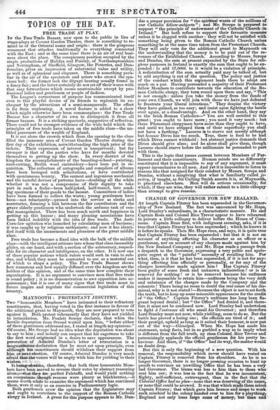MAYNOOTH : PROTESTANT JESUITRY.
Two "honourable Members " have intimated to their refractory constituents, that, having voted in the first instance in favour of the additional grant to Maynooth, they are now prepared to vote against it. Both protest vehemently that they have not yielded to intimidation. Mr. Poulett Scrope declares, that when the hostile deputation from Stroud waited upon him, "before either of these gentlemen addressed me, I stated at length my opinions." Of course, Mr. Scrope had no idea what the deputation was about to say to him ; and nobody can suspect that his eagerness to take the first word originated in a desire to save appearances. The peroration of Admiral Dundas's letter of retractation is a magnaiiithoug--declaration that he must act upon principle, even although his E:constituents should withdraw their support from him at next feleetion. Of course, Admiral Dundas is very much afraid that:the voters will be angry with him for yielding to their
wishes. ,,is no, It heinwastasiiiin,. therefore, that both these honourable Mem- bers have been moved to reverse their votes by abstract reasoning akne,-.--thatthey fire .perfect Falstaffs, and would yield nothing on compulsion though reasons were plenty as blackberries,—it seems worthwhile'to examine the argument which has convinced them, were it only as an exercise in Parliamentary logic. Both gentlemen avow the opinion that the Legislature may and ought to contribute to the support of the Roman Catholic clergy m Ireland. A grant for this purpose appears to Mr. Dun- das a proper provision for "the spiritual wants of the millions of our Catholic fellow-subjects " ; and Mr. Scrope is prepared to support "the principle of endowment of the Catholic Church in Ireland." But both refuse to support their favourite measure unless it be clogged with another : they will not be satisfied with something being given to the Roman Catholic Church unless something be at the same time taken from the Protestant Church. They will only vote for the additional rant to Maynooth on the understanding that the money is to be paid out of the re- venues of the Established Church. According to Messrs. Scrope and Dundas, the sum at present expended by the State for reli- gious purposes in Ireland is exactly the sum that ought to be ex- pended: to add 17,000/. to it would be a violation of principle. A redistribution of the sum actually paid may be talked of, but to add anything is out of the question. The policy and justice of the conduct which this argument leads them to adopt are much on a par. Having persuaded a majority of their Protestant fellow Members to contribute towards the education of the Ro- man Catholic clergy, they turn round upon them and say, "This is not enough : unless you take the money from the funds of your own Church, we will join with those we have just defeated to frustrate your liberal intentions." They despise the victory they have gained, as too easy; and insist upon fighting the battle over again, at a disadvantage. And on the other hand, they sayr to the Irish Roman Catholics—" You are well entitled to this grant ; you ought to have more ; you need it very much : but these Protestant clergyrmen have more than they ought to have, and until we have stripped them of their superfluity you shall not have a farthing." Lazarus is to starve not merely although but because Dives has too much. True, there is food to be had which Dives cannot withhold : but abstract justice demands that' Dives should give alms; and he alone shall give them, though Lazarus should starve before the millionaire be persuaded to part with them.
This is the logic that passes current between Members of Par- liament and their constituents. Human minds are so differently constituted that it is impossible to say of any argument, it must appear inconclusive to all men. And yet it is impossible to listen to reasons like that assigned for their conduct by Messrs. Scrope and Dundas, without a misgiving that what is familiarly called je- suitry, if taught, as Sir Culling Smith asserts it is, at Maynooth, is practised elsewhere. Men will do actions occasionally, for which, if they are wise, they will rather submit to a little obloquy than attempt to give reasons.


























 Previous page
Previous page